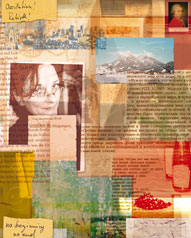So, yesterday I finally watched “Marie Antoinette”, regardless of the bad feeling I had ever since I heard of it as a Sophia Coppola project. I was right, it is a piece of overdressed drivel, but then I expected nothing more, surely not after the xenophobic, unreflected “Lost in Translation” and the meandering, or should I say pointless “Virgin Suicides”.
There are not many films about women out there. There are even less that are also directed by a woman. (One remarkable example that comes to mind is Jane Campion’s unforgettable “The Piano”.) This is why “Marie Antoinette” is such a wasted opportunity. From the first scene it is obvious, that Coppola had the budget for a grand costume drama about one of the most tragic women in the history of Europe, but she has neither the vision, nor the talent to craft the unique biography she has chosen into the film it could have been. In fact, she somehow managed to avoid the tragedy altogether and rendered the doomed woman into a frivolous, stupid blonde. We spend over an hour watching her shopping and pouting, because she cannot get her husband to sleep with her. We see her live it up at parties, meals, masked balls. We get more close-ups of shoes than we get of the population that would eventually cut off her head. While I understand that this is part of the film’s aim – show this life from MA’s perspective, from her isolated, uninformed point of view (she asks for more money without ever wondering where it comes from) – to cut the tragedy short at half point makes this just a pointless, costly music video. This brings me to the intensely annoying soundtrack. I get the idea that the clothes and the hair may be reminiscent of the New Romantics (in a strange forward loop), and perhaps Coppola took some inspiration from Baz Luhrman’s “Romeo and Juliet”, but what she created is highly distracting, to say the least. (I wonder, if this bizarre choice of songs is due to the influence of erstwhile boyfriend Quentin T.) At some points we do get period music – mostly when motivated by the action (visit at the opera, guitars playing, string quartets in the background), but at all other times the film is crowded with second rate pop, the lyrics of which are supposed to underline what is going on (that horrendous rendering of “Fools rush in” when the queen meets her lover? Ugh!).
I read Marie Antoinette’s biography by Stefan Zweig, which utterly fascinated me. I immediately knew that this could be a magnificent film, because of the overwhelming contrast between the cocooned life with all its excesses, wastefulness and blindness and the last four years of the queen’s life. The events themselves are tense enough: The royal family attempt to flee from France, are caught, incarcerated, the king undergoes a showtrial and is killed first, the queen's son and daughter are taken from her, and finally she herself makes that last journey to the guillotine. Not even her brother, the Emperor of Austria helped her. But even more intriguing is MA’s late attempt to partake in the politics of the revolution, that she even proved to be talented at it, much more so than her hapless husband. The tragedy lies, of course, in the fact that she engaged in these issues far too late and had to pay with her head for her erstwhile lack of interest.
None of this is in the film. It is as though this part of the biography is not interesting, which is, of course, just as idiotic a decision as was made for the plot of another recent costume drama about a woman, “The Duchess”. I had higher hopes for this flick, since I had no prejudice toward its (male) director and (male) screenwriters. But, alas, it has the same problem: a truly remarkable biography is cut off at the point where it gets interesting, where a real arc in the character is observable. Instead the decision was to stick with the fabulous, empty blather of great clothes, hair and bling, a threadbare love-triangle (or rather rectangle), and a lukewarm ending. Like Coppola’s creative miscarriage, this endeavour suffers the deadly disease of “it looks good”. Hatcher, Dibb & Co. had the golden opportunity to portray one of the first female politicians of Europe (who had not been born to sit on one or the other throne): A woman that morphed from beautiful style icon and society girl into a disfigured (which she allegedly found liberating) intellectual, who focused all her energy on the political issues of her day. Again, we see nothing of the latter part, and are stuck with the first half that is more watchable, in the minds of the filmmakers, if less meaningful.
And so we are left with portraits of women who look good, dress well, have affairs and unattractive husbands, too much money and cute little lapdogs. We never learn how they overcome this delusional predicament, this conflict that today may pertain to a Paris Hilton, but not many more. We never see how women back then could outgrow their prescribed role of the (unhappy) wife (in both films the protagonists succumb to their “duties”! In Coppola’s film that is even suggested to be an arc: "I will stay with my husband!" Infuriating!). Thankfully, both are eminently forgettable, although it is harder to forgive Coppola for messing up this one (but then: has she ever not messed up?). In fact, if I were to judge the character of the historical Marie Antoinette by this flick, I would say “good riddance!” to her ultimate fate, since according to Coppola’s portrait that head was filled with nothing but air anyway.
Sunday, May 31, 2009
Subscribe to:
Post Comments (Atom)



No comments:
Post a Comment